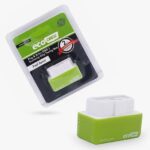Experiencing frustration trying to connect your OBD2 adapter to your Android head unit? You’re not alone. Many users encounter issues when attempting to pair these devices, hindering their ability to monitor vehicle diagnostics and performance directly from their car’s infotainment system. This article aims to provide a troubleshooting guide to help you resolve the “OBD2 won’t connect” problem and get your devices communicating smoothly.
Common Reasons for OBD2 Connection Problems
Several factors can contribute to the failure of an OBD2 adapter connecting to your Android head unit. Understanding these potential issues is the first step towards finding a solution.
- Bluetooth Pairing Issues: The most common connection method is Bluetooth. Pairing problems can arise from incorrect PIN codes, pairing timeouts, or conflicts with other Bluetooth devices.
- Compatibility Problems: Not all OBD2 adapters are compatible with all Android head units. Some adapters may have specific Bluetooth versions or protocols that are not supported by your head unit.
- Incorrect Settings on Head Unit: Android head units often have Bluetooth settings that need to be configured correctly for OBD2 devices. This might involve setting the correct PIN code or enabling specific Bluetooth profiles.
- Faulty OBD2 Adapter: While less frequent, the OBD2 adapter itself could be defective or malfunctioning.
- App-Specific Issues: The app you are using on your Android head unit to read OBD2 data might have its own connection settings or compatibility requirements.
Troubleshooting Steps to Resolve OBD2 Connection Issues
Let’s explore practical steps you can take to diagnose and fix the connection problem:
- Verify Bluetooth is Enabled and Discoverable: Ensure Bluetooth is turned on both on your Android head unit and your OBD2 adapter (if it has an on/off switch). Make sure your head unit is set to be discoverable by other Bluetooth devices.
- Check the Pairing PIN Code: Many OBD2 adapters use a default PIN code like “0000” or “1234”. Refer to your OBD2 adapter’s manual for the correct PIN. In your Android head unit’s Bluetooth settings, manually pair with the OBD2 device and enter the correct PIN when prompted. If you are facing issues with the PIN entry disappearing, try using an external USB keyboard to input the PIN, ruling out any on-screen keyboard glitches.
- Disable “Auto-Connect” and Force Manual Pairing: Some Android head units have an “auto-connect” feature for Bluetooth. Disabling this and manually initiating the pairing process can sometimes resolve connection hiccups. This allows for a more controlled pairing sequence where you can ensure the PIN is entered correctly.
- Test with a Different OBD2 App: The issue might lie with the OBD2 app you are using. Try a different OBD2 app from the Google Play Store to see if the connection problem persists. Popular apps include Torque Pro, OBD Fusion, and Car Scanner ELM OBD2.
- Test the OBD2 Adapter on Another Device: To rule out a faulty OBD2 adapter, try connecting it to another Android phone, tablet, or even a laptop. If it connects successfully to other devices, the problem is likely with the head unit or its settings.
- Check OBD2 Adapter Compatibility: Verify that your OBD2 adapter is compatible with your Android head unit’s Bluetooth version and protocols. Consult the specifications of both devices. Some older head units might not support newer Bluetooth standards or specific OBD2 adapter types.
- Restart Devices: A simple restart of both your Android head unit and your vehicle (which resets the OBD2 port) can sometimes clear temporary glitches and resolve connection problems.
- Firmware Updates: Check if there are firmware updates available for your Android head unit. Manufacturers sometimes release updates that address Bluetooth connectivity issues.
Conclusion
Connecting an OBD2 adapter to your Android head unit should be a straightforward process, but sometimes, roadblocks occur. By systematically troubleshooting using the steps outlined above, you can often identify and resolve the “OBD2 won’t connect” issue. Remember to check for basic problems like Bluetooth being enabled and the correct PIN code, and progressively move towards more complex checks like compatibility and app-specific issues. With patience and methodical troubleshooting, you should be able to get your OBD2 adapter working seamlessly with your Android head unit.
